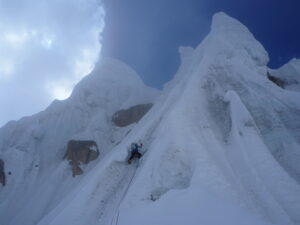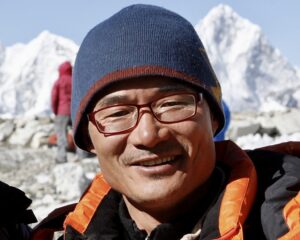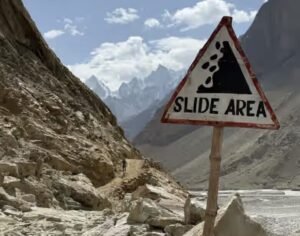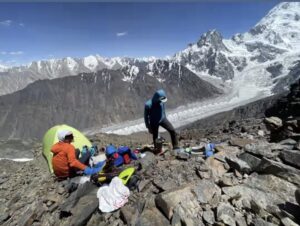Jakub Vlcek, Peter Macek, and Wajidullah Nagri are safely back in Gilgit, but the details about their climb and rescue on Rakaposhi are far from clear.
Exactly what happened on the mountain differs depending on who tells the story. Meanwhile, the climbers are now dealing with blowback from climbing without a permit and what that means for their insurance policy.
Competing versions
Jakub Vlcek gave some interviews to Czech media yesterday, and today he posted a statement on his Facebook page. In both, he and partner Peter Macek say that contrary to official reports, they felt fine on Rakaposhi and did not need rescue.
Instead, they say that their Pakistani partner, Wajidullah Nagri, stayed behind on the summit, taking photos and making phone calls. They waited for him for over an hour at 7,500m. By then, Vlacek states, Nagri was disoriented and had lost some of his clothing and gear. Nagri was the one who refused to move down on the following days.
This, according to Vlceck’s report, is what prompted them to ask for help. They didn’t even need the food that the helicopters dropped, although they used the extra rope to secure Nagri’s descent. Finally, contrary to a statement by Abdul Joshi, the Czech climbers say that the helicopter did not use a long-line — that it actually landed.
In the interview, the climbers cite the communication difficulties between them and the rescue teams. This statement seems plausible, considering the radically different versions of the rescue operation. This is also clear from some messages that ExplorersWeb has seen.
A difficult rescue
Abdul Joshi, leader of the on-ground rescue team, says that the rescue was particularly difficult for a number of reasons:
1) The Czech climbers did not have a permit to climb the mountain.
2) They had no base camp, no ground team, and no management team.
3) They did not fix ropes while climbing up the mountain.
4) Since they had no documentation anywhere, their insurance agency was not willing to cover the rescue.

Abdul Joshi, left with Karim Hayat. Photo: Abdul Joshi
Vlcek and Macek have agreed to an interview with ExplorersWeb. We will publish it in a separate story as soon as possible.
Meanwhile, Karim Shah Nizari confirms that everything he previously told ExplorersWeb — including the panic at 6,200m when one of the Czechs did not want to stay behind — came from listening to the pilots.
Who’s gonna pay for the party?
Although safe, the rescued climbers now face the consequences of climbing Rakaposhi without a permit. And who foots the bill for the rescue?
According to Dawn, an official letter states that “the two foreigners had applied for a permit to summit Rakaposhi on July 16, but the permission was not granted due to security concerns.”
Authorities got wind of the climb through social media. Gilgit-Baltistan’s Tourism Minister Raja Nasir said the Czech pair “had neither obtained any non-objection certificate (NOC) nor a tracking permit nor paid insurance-related costs as well as the Rs3 million to Rs4m fee for a helicopter rescue.”
“We are taking action against them…Until they pay helicopter expenses, we will keep them in Gilgit,” the minister told Dawn.
“It’s their rules and we must respect them.” — Marek Holocek
Meanwhile, the climbers’ travel insurance company might refuse to pay for the rescue expenses, according to Seznam Zpravy. A spokesperson for UNIQA insurance told the media that the company was not supposed to pay for rescue because the mountain was in a “dangerous” area not recommended for tourism by the Czech government. The lack of a proper permit also invalidates the climbers’ coverage.
Czech media also asked climbing star Marek Holecek about the issue. He agreed that the climbers should have waited for the permit. “It’s their [Pakistan’s] rules and we must respect them, whether we like them or not,” he said.

Helicopter pilots, rescued climbers, and local authorities. Photo: The Rakaposhi rescue team
Rescuer Abdul Joshi also asks that all foreign climbers stick to the rules and climb responsibly. “Otherwise, you are not only risking your own life,” he said. “[You] are a danger to the whole climbing community.”
The ongoing investigation should also affect the Pakistani climber, Wajidullah Nagri. Pakistan Alpine Club’s secretary Karrar Haidri told ExplorersWeb that while Pakistani citizens don’t have to pay a climbing fee to attempt Rakaposhi, they still must cover a waste management fee and the porter/guide insurance. They also need a permit to climb all mountains above 6,500m.
Pakistan and other countries have followed this rescue with great interest. The plight of the climbers drew volunteers, army resources, and political representatives. The situation has also highlighted some pressing issues, such as better control of climbing expeditions and as Abdul Joshi suggests, the need for a proper rescue system in Pakistan.





